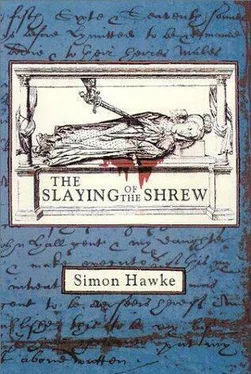Simon Hawke - The Slaying Of The Shrew
Здесь есть возможность читать онлайн «Simon Hawke - The Slaying Of The Shrew» весь текст электронной книги совершенно бесплатно (целиком полную версию без сокращений). В некоторых случаях можно слушать аудио, скачать через торрент в формате fb2 и присутствует краткое содержание. Жанр: Исторический детектив, на английском языке. Описание произведения, (предисловие) а так же отзывы посетителей доступны на портале библиотеки ЛибКат.
- Название:The Slaying Of The Shrew
- Автор:
- Жанр:
- Год:неизвестен
- ISBN:нет данных
- Рейтинг книги:5 / 5. Голосов: 1
-
Избранное:Добавить в избранное
- Отзывы:
-
Ваша оценка:
- 100
- 1
- 2
- 3
- 4
- 5
The Slaying Of The Shrew: краткое содержание, описание и аннотация
Предлагаем к чтению аннотацию, описание, краткое содержание или предисловие (зависит от того, что написал сам автор книги «The Slaying Of The Shrew»). Если вы не нашли необходимую информацию о книге — напишите в комментариях, мы постараемся отыскать её.
The Slaying Of The Shrew — читать онлайн бесплатно полную книгу (весь текст) целиком
Ниже представлен текст книги, разбитый по страницам. Система сохранения места последней прочитанной страницы, позволяет с удобством читать онлайн бесплатно книгу «The Slaying Of The Shrew», без необходимости каждый раз заново искать на чём Вы остановились. Поставьте закладку, и сможете в любой момент перейти на страницу, на которой закончили чтение.
Интервал:
Закладка:
“ ‘Twould have made no difference in the end, Tuck,” said Shakespeare, gently. “Last night, as it turns out, Middleton was in London with his daughters. We did not know that then, yet even if we did, word could never have reached him in time to save Catherine. How were you to know that someone meant to kill her? And even if you knew, you could not have known she would be poisoned.”
“Your friend speaks sensibly and truly,” Worley said. “You are entirely blameless in the matter, Tuck. The guilt rests with the murderers. And we shall find them, have no fear. There cannot be many here who are not known to me. We shall look to Blanche’s suitors for our suspects.”
“But will they not be forewarned now?” Smythe asked.
“Perhaps,” said Worley. “However, we have a number of things working in our favor. For one thing, they may not know who you are. And for another, even if they do, they can have no way of knowing that you have discussed with me the things you overheard last night. They shall have no reason to suspect any relationship between us, and we shall give them no reason to suspect one. For all they know, you are merely someone who may have overheard part of their conversation last night. They cannot know for certain what you may have heard, or whether you shall do anything about it, or even whether you shall make any connection between their plot to impersonate aristocrats and Catherine’s death.”
“But in either case,” said Shakespeare, “would it not be in their interest to eliminate even the least possibility that their plot may be exposed?”
“To be sure,” Worley agreed. “And they have already demonstrated their willingness to do so in their attack on Tuck. And if they did not hesitate to do so once, they shall not hesitate to try again. Remember that without Blanche Middleton, they have nothing. The entire success of their plan rests on their remaining here and seeing it through. And that is where they shall give themselves away.”
Smythe sighed. “I fear I know where this is headed.”
Worley clapped him on the shoulder. “Tuck, no one shall force you to take any risks you do not wish to take,” he said. “But consider that one woman has already died and the welfare of another is at stake.”
“I had already considered those things, Sir William,” Smythe replied. “And there can be no question but that I must do whatever must be done. I am completely at your service.”
“Good lad.”
“I, too, stand ready to assist,” said Shakespeare. “What would you have us do?”
“I knew that I could count on you both,” Sir William said. “We shall have to move quickly, however. The more time that elapses, the more it favors the killers.” He turned to Shakespeare. “Will, you must make all haste to London with this flask and see your Granny Meg. I shall have a carriage made ready for you at once.”
“We shall change our clothes and leave immediately,” said Smythe.
“Not you, Tuck,” Worley said. “You shall be staying here. You have a different part to play.”
“That of the Judas goat,” said Smythe, dryly.
“Precisely. We must bait them into coming after you once more. Are you up to it?”
Smythe took a deep breath. “I am.”
“Good. Now, the first order of business shall be to get Will on his way to Granny Meg’s and then see to Catherine’s funeral. I shall speak with Godfrey Middleton and fix him to our purpose. It shall not be difficult. He may appear foppish, but there is iron in his spine. I should not wish to have him as an enemy. Once he finds out that his daughter has been murdered, he shall not rest until he has seen her killers brought to justice. But at the same time, we must see to it that in his anger, he does not give our plan away.”
“We have a plan, then?” Shakespeare asked.
“Aye,” Smythe replied, “to put me into harm’s way and see who tries to harm me.”
“Ah. It sounds like a good plan to me.”
“Oh, does it, indeed?” asked Smythe, wryly.
“Well, I much prefer it to putting myself into harm’s way,” the poet said, nonchalantly.
“ ‘Twould be an awful thing if the carriage hit a rut and dropped a wheel on its way to London, so that you fell out and broke your neck,” said Smythe.
“Aye, and ‘twould be terrible if someone stuck a rapier in your gizzard whilst I was not there to watch your back,” Shakespeare riposted.
“If you two are finished fencing, there is more to be discussed,” said Worley. “Now then, mark me well, here is what we shall do…”
The journey back to London in Godfrey Middleton’s light carriage took far less time than the trip out, but it was also far less comfortable. When they had set out for Middleton Manor, the Queen’s Men had travelled by horseback and by wagon, but because their wagon was large and rather cumbersome and loaded with all of their gear, they had traveled slowly, those of them on horseback proceeding at an easy walk so as not to lose the wagon. This was Shakespeare’s first ride in a gentleman’s open carriage, and he was not especially enjoying the experience.
The well-padded, velvet-covered seats were certainly a vast improvement over a simple leather saddle or the hard, unupholstered wooden bench of a wagon, but the rate at which they travelled made the carriage bounce and jounce as they careened along the rutted road to London and each jarring impact was transmitted through the wooden wheels of the carriage to its frame, then through the seats, despite their padding, directly into the poet’s bones. Every bump made his teeth click together sharply and at least twice he had almost bitten through his tongue. Sir William had directed the driver to waste no time in getting him to London and back, and the man was complying with disconcerting efficiency.
Shakespeare knew better than to ask the driver to slow down. The liveried servant had stared at him with thinly veiled contempt when he discovered whom he would be driving to the city and back. After all, he was a gentleman’s driver. He had certain standards and a reputation to uphold. And Shakespeare knew that he did not even remotely resemble a gentleman.
Someday, he thought, it would be a fine thing to be able to call oneself a gentleman, with good clothes and a grand house and servants who would tug their forelocks at you. He imagined what it must be like to have his own coat-of-arms to display over his doorway and his mantelpiece, and have painted on the sides of a fine, black-lacquered coach. A coach whose driver he could order to drive slowly. He swore to himself as yet another jarring impact shot painfully through his tailbone into his spine. If this was how a gentleman was meant to travel, then he could damn well do without it. If I should ever become a gentleman, he thought, then I shall travel everywhere on horseback. At a walking pace.
It struck him suddenly how utterly ludicrous that thought was. That an actor should ever be regarded as a gentleman was simply ridiculous. An actor, he thought, had about as much chance of becoming a gentleman as he did of being knighted. Still, it was a lovely fantasy with which to pass the time.
It was not very long before the rutted road led to the outskirts of the city and then gave way to London ’s cobbled streets, which were no less gentle to the poet’s fragile frame than they were to the stout, wooden frame of the carriage. Shakespeare swore softly to himself as he shifted uncomfortably in his seat. Carriages and coaches were a fairly recent addition to the traffic on the streets of London, but there were now so many of them vying for space with the wooden-wheeled carts and wagons of the farmers and tradesmen, not to mention the horses and pedestrians, that the streets were more often than not hopelessly clogged. It was becoming insufferable and Shakespeare could not see it getting any better as more and more of the “new men” were infiltrating the ranks of the upper classes and buying carriages and coaches of their own.
Читать дальшеИнтервал:
Закладка:
Похожие книги на «The Slaying Of The Shrew»
Представляем Вашему вниманию похожие книги на «The Slaying Of The Shrew» списком для выбора. Мы отобрали схожую по названию и смыслу литературу в надежде предоставить читателям больше вариантов отыскать новые, интересные, ещё непрочитанные произведения.
Обсуждение, отзывы о книге «The Slaying Of The Shrew» и просто собственные мнения читателей. Оставьте ваши комментарии, напишите, что Вы думаете о произведении, его смысле или главных героях. Укажите что конкретно понравилось, а что нет, и почему Вы так считаете.












